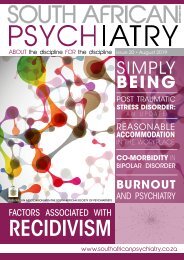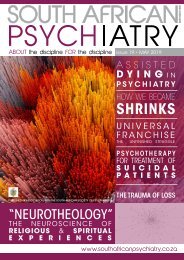South African Psychiatry - February 2019
South African Psychiatry - February 2019
South African Psychiatry - February 2019
Create successful ePaper yourself
Turn your PDF publications into a flip-book with our unique Google optimized e-Paper software.
UPDATE<br />
Corlia Schutte, occupational therapist at the<br />
Livewell Village in Bryanston, says that it is essential<br />
in dementia care to ensure that the person is<br />
adequately stimulated according to their individual<br />
and constantly evolving needs, but at the same time<br />
they should not feel overwhelmed by an overload of<br />
sensory information.<br />
“THE SENSORY ROOM IS PROVING<br />
POPULAR FOR THOSE RESIDENTS WHO<br />
REQUIRE A PEACEFUL RETREAT AFTER AN<br />
EXCITING DAY OF ACTIVITIES, OR WHO<br />
ENJOY A RICH SENSORY EXPERIENCE<br />
THAT PLEASANTLY STIMULATES THEM. IT<br />
IS ALSO MOST USEFUL IN THOSE CASES<br />
WHERE THE INDIVIDUAL MAY FEEL<br />
FRETFUL AND DISORIENTATED, WHICH<br />
QUITE COMMONLY OCCURS IN PEOPLE<br />
WITH DEMENTIA.”<br />
She says the team meticulously records which<br />
aspects of the room a particular person with<br />
dementia engages with, and what affects this has<br />
on their mood and behaviour. “This is enabling us<br />
to build up a very useful record that helps us to<br />
enhance the room and the experience it creates for<br />
our residents.<br />
WE CAN ALSO USE THIS INFORMATION TO<br />
TAILOR AND ADAPT THE ENVIRONMENT<br />
TO SUIT THE INDIVIDUAL’S MOOD AND<br />
PREFERENCES AT A PARTICULAR TIME.”<br />
The muted lighting in the room is accented with<br />
softly glowing coloured lights, and a soundtrack of<br />
melodious classical music incorporating natural<br />
sounds of birdsong, ocean waves and running water<br />
create a sense of serenity in the room. A soothing<br />
scent of lavender aromatherapy oil permeates the<br />
air – an aroma that is known for its relaxing qualities<br />
for many people, according to Schutte.<br />
Drapery on the ceiling creates the feeling of a<br />
sheltered, cosy womb-like environment, which is also<br />
aesthetically pleasing, while comfortable antique<br />
rocking chairs and ottomans, textiles of various<br />
textures and cool, pale blue green painted walls<br />
are familiar and evocative of peace and safety.<br />
She notes that the sensation of gently rocking in<br />
a rocking chair is particularly comforting for some<br />
people with advanced dementia.<br />
An array of old-fashioned toys, weighted cuddly toys<br />
and dolls are available in the room for people to<br />
hold. “The sensation of cradling a weighted doll is<br />
especially comforting for many of our residents and<br />
we have noted that it often serves to reduce feelings<br />
of agitation or stress. It is believed that certain people<br />
with dementia are drawn to such items because<br />
they replicate similar feelings to that of a parent<br />
caring for a baby.<br />
“Some of our residents are moved to caress and<br />
hum to a doll as a mother will comfort her infant, and<br />
this can be a welcome distraction if the person has<br />
become upset, as it replaces this emotion with more<br />
positive feelings of love and protective, nurturing<br />
instincts,” observes Schutte.<br />
“IN DIFFERENT MOODS, THE SAME<br />
RESIDENT MAY FIND DIFFERENT ASPECTS<br />
OF THE EXPERIENCE OF THE SENSORY<br />
ROOM ENTICING. A CERTAIN RESIDENT<br />
MAY BE FEELING LOW ONE DAY, AND WE<br />
BRING THEM TO THE SENSORY ROOM<br />
AND NOTICE THAT THEY CONCENTRATE<br />
DEEPLY ON THE MUSIC, BECOME MORE<br />
SUBDUED, AND LATER APPEAR TO BE<br />
MORE UPLIFTED AFTER SPENDING TIME<br />
THERE. IN ANOTHER MOOD, THE SAME<br />
RESIDENT MAY STROKE THE SOFT FABRICS<br />
AND HANDLE THE TOYS, AND BE LULLED<br />
INTO A CALMER MOOD.”<br />
She says that at other times, the Livewell team may<br />
find the person is not inclined to spend time in the<br />
room and may prefer to rather be out and about<br />
in the garden watching the birds or picking flowers,<br />
and this is also encouraged.<br />
“While people with dementia may not always be<br />
able to express what they feel like doing, we are so<br />
sensitive to their non-verbal cues that we can usually<br />
tell whether they are in the mood for a particular<br />
activity or environment at a given time, and can<br />
make adjustments for their comfort accordingly.”<br />
“The Sensory Room at Livewell Villages in Bryanston<br />
is proving to be an invaluable tool that is not only<br />
assisting in providing residents with appropriate<br />
levels of stimulation, but is also helping many to deal<br />
with their feelings of agitation and promoting an<br />
improved sense of wellbeing. While these benefits<br />
may seem somewhat intangible, we as carers can<br />
observe the very real difference this facility is making<br />
to the lives of many of our residents,” concludes<br />
Schutte.<br />
For more information about the Livewell Villages and the<br />
services available, please visit: https://livewell.care/<br />
Issued by Martina Nicholson Associates (MNA) on behalf of Livewell Villages Correspondence:martina@mnapr.co.za<br />
46 * SOUTH AFRICAN PSYCHIATRY ISSUE 18 <strong>2019</strong>
















